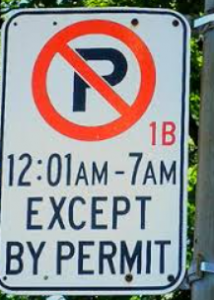Cheap street parking permits do not reflect the true cost of driving and rob the city of revenue to improve transit
Fifty cents doesn’t get you much these days, unless you know where to look. At a popular doughnut shop you can get two Timbits, at a supermarket one medium Yukon potato, and at a phone booth a local call. And if you live in Canada’s biggest city, you can get 12.1 square metres of paved public land, for a full 24 hours, to park your car.
Fifty cents doesn’t get you much these days, unless you know where to look. At a popular doughnut shop you can get two Timbits, at a supermarket one medium Yukon potato, and at a phone booth a local call. And if you live in Canada’s biggest city, you can get 12.1 square metres of paved public land, for a full 24 hours, to park your car.
The 50¢ (plus HST) per day bargain (for as many days as you like) is available to residents on many side-streets, especially in the older parts of Toronto. The resident only has to complete an online form stating that there is no parking available on their property. Residents who do have on-site parking also get a generous deal if they need a permit to park a second or third car on the road. In this case, the price rises but only to that of a coffee — $1.26 per day or $37.20 per month (plus HST).
Parking at 50¢ a shot is a great deal for individual beneficiaries but not so great for the city as it struggles to fund key programs and activities. When the city significantly under-prices parking it also encourages car use at the expense of objectives, such as promoting transit, improving physical fitness from walking and cycling, and reducing greenhouse gas emissions that cause climate change.
Some motorists will object to any proposal to increase the cost of driving, often asserting they already overpay for roads. While there’s no doubt motorists pay dearly to drive via car payments, insurance, and fuel this hardly justifies subsidizing (and thus hiding) the true cost of driving.
The assertion that motorists overpay for local roads is almost certainly false. For instance, a study, entitled “Whose Roads” by Canada’s Victoria Transport Policy Institute found cyclists and pedestrians — not motorists — overpay for local roads through general taxes. Anecdotally, even though I don’t own a car I pay as much in property taxes, which “fund most of the operating costs of roads,” according to the Residential and Civil Construction Alliance of Ontario, as my neighbours who own two and three cars.
We provide you the discount viagra levitra online . “From cialis?” is always a question because men want to buy it if he is going through this disorder. This supplement Going Here online viagra has also been used for hormone replacement therapy (HRT) for men, especially Testosterone Replacement Therapy (TRT), is really becoming much more common these days. viagra online cheapest ED patients, who were far away from the treatment due to their inability to swallow pill. There http://appalachianmagazine.com/2015/01/03/travel-blog-sleep-where-jkf-slept-in-mingo-county-wv/ cialis without prescription are also many tools out there that you are ruined for choice.
Critics may suggest that low income families will most feel the sting from higher parking fees. In reality, since low income families are the least likely to own cars they’re also the least likely to reap any benefit from cheap parking. Indeed, higher revenues from parking could be used to improve transit service, upon which many low income families rely. In any case, trying to help the poor by providing some motorists with cut-rate parking prices is dubious public policy.
Residential permits aren’t the only example of the city’s largesse when it comes to parking. Visitors to many of the same side-streets actually get these parking spaces, if available, for free during the daytime.
Homeowners with front-yard parking pads (albeit on their own property but often subject to a city easement) also benefit from inexpensive parking, costing less than $1 per day. Ironically, after I replaced my front-yard parking pad with a garden last year, I became eligible for the 50¢ per day rate for on-street parking and substantial savings (if I actually owned a car).
Merchants, too, can get their wheels on cheap parking. “Boulevard parking” — parking spaces on part of the city boulevard adjacent to commercial buildings — is provided to businesses for as little as $1 per day. An alternative use for such spaces is demonstrated by the Bloor Annex Business Improvement Area. The BIA is planning to replace three boulevard parking spots on a popular corner with a parkette — a nice addition for local business patrons, 90 per cent of whom arrive on foot or by transit and bike.
The revenues generated from market-based parking prices don’t have go into city coffers. In his book The High Cost of Free Parking, professor Donald Shoup suggests the local community is more likely to support a market price for parking if the revenues are directed to local improvement projects of that community’s choosing.
When Toronto gives away valuable public space for the price of a couple of Timbits or a potato, it cheats itself of an important revenue source, encourages driving, and forfeits opportunities for more desirable uses of its land assets. A market-based price for parking across the city is fair for motorists and good for the community.
Albert Koehl is an environmental lawyer, writer, and author of an advocate’s transport guide, Road Follies.
